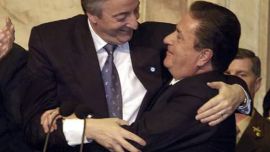Alberto Fernández and Martín Guzmán would very much like people to think they have managed to browbeat the International Monetary Fund into backing the easygoing economic policies they have been applying so the government can continue to throw money at problems in its usual way because, they insist, “growth” will supply it with more than enough to keep people happy while it goes about reducing the fiscal deficit, putting a brake on inflation and technical stuff like that.
After prematurely announcing they had made the meddlesome technocrats holed up in Washington see reason, Alberto and his economic minister found themselves under fire from the IMF, zealots attached to the Kirchnerite wing of the governing coalition, members of the opposition and sceptical commentators both here and abroad. IMF spokespeople quickly pointed out that it would be months before a final agreement got hammered out though, for starters, the Argentine negotiators had committed themselves to eliminating the fiscal deficit by 2025 and doing something about the ruinous practice of charging people in key electoral districts a mere fraction of the real costs of the gas and electricity they consume.
That the alleged agreement, even one as soft as Guzmán swore it was, would entail some drastic cost-cutting was understood perfectly well by the Kirchnerites, among them Cristina Fernández de Kirchner’s son Máximo who immediately quit his post as leader of the Peronist bloc in the Lower House because, he proudly stated, he refused to give his support to policies that did not meet with his approval. For some, this was a sign that the fractious ruling coalition Cristina put together is coming apart at the seams, but it so happens that many who share Máximo’s views are members of La Cámpora organisation he heads and are reluctant to relinquish control of the well-funded public entities that provide rewarding jobs for their supporters and serve them as war chests.
The ill-tempered conflict between those who still hope Alberto will succeed in taming the more fanatical Kirchnerites and their rivals who want him to remain under Cristina’s thumb confronts the opposition alliance with an awkward dilemma. Its leaders are fully aware that breaking with the IMF, as Cristina and her cronies seem to want, would have unpleasant consequences for the country’s inhabitants and will therefore be inclined to give their parliamentary support to whatever agreement finally emerges. What they do not want, however, is to be seen joining a handful of Peronist legislators to back a bill which would result in hardship for a great many people, while allowing the Cristina and her diehard followers to pose as brave defenders of the innocent victims of a gang of “neoliberal” sadists bankrolled by Yankee imperialists. This is why opposition leaders continually remind us that they are not in government and will not be before next year is about to depart and therefore cannot be expected to assume responsibility for whatever Alberto does until then.
Though it would seem that most politicians have come to believe that the economy could do with a strong dose of realism as recommended not only by the IMF but also by an overwhelming majority of local and foreign experts, they cannot do much to thwart the Kirchnerites who dream of emulating their Venezuelan and Cuban comrades by sacrificing the country on the altar of the ideology they have improvised; Argentina’s political system is so inflexible that it is terribly hard for the country to change course even when circumstances make it imperative.
No matter what happens, everyone involved in politics, from the president down to the lowliest municipal councillor, must adapt his or her behaviour to the demands of the electoral calendar. As Cristina and those who obey all her orders keep reminding us, they are against anything which smacks of austerity not just because they are kind-hearted but also because they fear it would cost them dearly over a year from now when voters go to the polling booths.
Opposition leaders like Mauricio Macri, Horacio Rodríguez Larreta, Patricia Bullrich, Gerardo Morales and Alfredo Cornejo also have their eyes firmly pinned on late 2023. As a result, like the Kirchnerites they are playing a long game, even though it is evident to them that Argentina urgently needs a political realignment so the many who are willing to face the unpleasant fact that the country, which has already run out of cash, simply cannot continue to live beyond its means forever, can take on those who think it is in their own interest to pretend otherwise and, in some cases, even take the nonsense Cristina spouts seriously.
With elections well over a year away, politicians are prone to console themselves with the thought that they have plenty of time in which to work out what should be done to save the country from going under. This no doubt is one reason why Alberto’s government has yet to come up with anything resembling an economic programme. After taking over from Macri’s administration, it let the months slip by because, rather like the man Alberto replaced, its leading lights assumed that their mere presence in office would be more than enough to put everything right. When they belatedly realised that things were not turning out as splendidly as they had imagined, they already had to take into account the electoral impact of measures designed to tackle the mounting deficit, the skyrocketing fuel bill, inflation and, needless to say, an extremely costly pandemic.
Unluckily for them, by the time the parliamentary elections were held, a large chunk of the population had come to the conclusion they had no real idea of what should be done to reinvigorate the economy. Since then, they have been hoping that voters can be persuaded that Macri is still in charge of the economy and should shoulder all the blame for its many failings. For leaders of a political movement which has survived for so long thanks almost entirely to the inability of its opponents to provide an alternative which is both clearly viable and electorally attractive, this tactic must seem logical enough, but, as the country’s situations continues to worsen, its chances of working yet again look increasingly slim.



















Comments